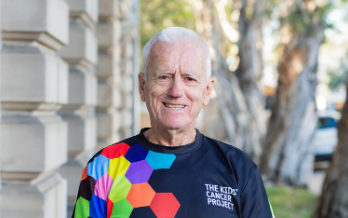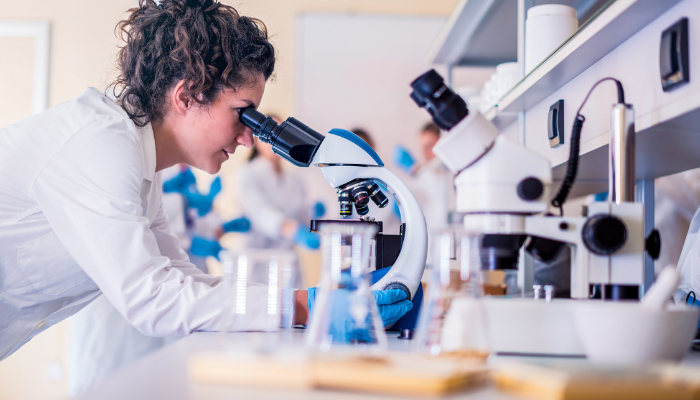
Recipient: Dr Rachael Lawson
Institute: Children’s Health Queensland Hospital and Health Service
Funding: $204,000.00
Dr Rachael Lawson is a researcher at the forefront of the field of Precision Medicine and a passionate clinician working with Children's Health Queensland. Their innovative work in unravelling the complexities of optimising and individualising drug dosing has had a profound impact on the field.
With a PhD from the University of Queensland, Dr Lawson is increasingly contributing to scientific literature within the field of precision medicine and stem cell transplantation.
Driven by curiosity, they have delved into optimising drug dosing of both busulfan for stem cell transplantation and supportive care medicines, shedding light on how busulfan clearance can change during treatment impacting patient outcomes.
Collaborating with the Australia & New Zealand Children's Haematology/Oncology Group (ANZCHOG), I’m Principal Investigator for a multicentre prospective clinical study investigating busulfan dosing, which involves clinical pharmacokinetic (PK) and pharmacodynamic (PD) studies.
Motivation
I have cared for children experiencing significant toxicities from chemotherapy and others relapsing from ineffective treatment. My principal research areas are pharmacogenomics in paediatric oncology, therapeutic drug monitoring and software-informed dosing with the aim to personalise initial doses to the individual child and improve predictions of next doses to prevent toxicities and improve efficacy.
As the oncology clinical team lead pharmacist at the Queensland Children's Hospital for the past 15 years I’ve always been interested in research to further knowledge in the field. However, when I encountered a clinical dilemma relating to intravenous busulfan, routinely used for stem cell transplants, I decided I needed to be involved in finding answers to our unresolved questions.
In 2016, I coordinated the opening of a collaborative trial to explore how the clearance of busulfan changes over the course of treatment with the aim of increasing the number of patients attaining target exposure. Using concepts of precision medicine, I developed a clear research goal of improving the dosing of chemotherapy and supportive care for kids with cancer. My research focuses on optimising drug dosing, a key intervention to improve patient outcomes.
Researching Precision Medicine
Precision medicine is an emerging field that is developing quickly. However, the use of model-based software to measure exposure and predict the next doses, as well as the use of pharmacogenomics to help individualise initial doses, is currently underutilised in kids with cancer. My project (IMPROVE study) will compare the effectiveness of genomic testing with a genotype-based dosing guideline plus software-informed dose optimisation (ARM 1) with a prior standard of care (ARM 2) in children undergoing haematopoietic stem cell transplant in achieving individualised exposure target and effect on patient outcomes.
Both approaches will use busulfan plasma concentrations measured for therapeutic drug monitoring following each of four consecutive once-daily doses. Our software-informed dose optimisation technique will use model-based software (derived from pharmacokinetic dosing models) with Bayesian forecasting* and therapeutic drug monitoring to predict maximally effective dosing regimens. This project will serve to be an exemplar within the Queensland Children's Hospital for translation to other drugs, as well as for translation to other national and international paediatric oncology centres. The results of this study will be reported at national and international conferences and submitted for publication, with methods and materials included to ensure the process is easily replicated. Additionally, this project will develop educational material and guidelines for the implementation of software-informed dosing that will be shared widely to accelerate national adoption of this into standard clinical practice to expand the benefits wider.
(* Bayesian forecasting provides a natural way of combining old information with new data, within a solid theoretical framework. You can incorporate past information about a variable and form a prior distribution for future analysis. When new observations become available, your previous prediction can be used as old information – Ed.)
The IMPROVE study
The IMPROVE study will initially focus on one drug, busulfan, which is used as a component of the conditioning regimen prior to haematopoietic stem cell transplantation. An allogeneic haematopoietic stem cell transplant (HSCT) is where the recipient’s blood and marrow are replaced with donor haematopoietic stem cells and is commonly used for malignancies of the blood cells (leukaemia and lymphoma). HSCT with a return of the patient's own stem cells (autologous HSCT) can be used to rescue a patient from very intense chemotherapy (some solid tumours including neuroblastoma and Ewing sarcoma).
Bone marrow is the spongy part of bones and is found in the centre part of the bones mainly in the hips, ribs, breastbone and the spine. The bone marrow contains multipotential haematopoietic stem cells which can become red blood cells, platelets and white blood cells including basophils, neutrophils, monocytes, T-cells and B-cells.
An allogeneic HSCT replaces diseased or damaged cells with healthy stem cells that can grow new white blood cells, red blood cells and platelets. Conditioning occurs prior to HSCT and includes chemotherapy +/- Total body irradiation +/- immunotherapy. The aims of conditioning therapy include destroying any remaining cancer cells (for malignant indications), making space in the bone marrow for the new stem cells to engraft and targeting the patient’s circulating immune cells to reduce the risk of graft rejection (for allogeneic HSCT).
Making a difference to kids with cancer
Pharmacogenomics relates to the study of genetic factors that determine variability in drug exposure or pharmacological response. Implementing pharmacogenomic testing can enhance drug safety, helping to improve drug efficacy and reduce the risk of toxicity. There is increasing evidence that genomic information can be harnessed to ensure the right drug and the right dose is used in the individual. However, in clinical practice, there is a limited translation of this literature utilising pharmacogenomic data, providing a significant unmet need. Incorporating genomic data to personalize medication choice and dosing can improve outcomes and reduce acute and long-term toxicity in cancer treatment.
Pharmacogenomic testing reveals that a substantial percentage of patients would require deviation from standard dosing (40-80% depending on the number of genes tested), emphasizing the need for individualized approaches. Model-based methods, using mathematical models to describe drug pharmacokinetics and pharmacodynamics, offer advantages over traditional dosing approaches. These methods enable more accurate prediction of drug exposure and response, optimization of dosing based on individual characteristics, and reduced risk of adverse events and toxicity. The integration of Bayesian forecasting software and pharmacogenomics holds great potential in revolutionizing paediatric oncology through optimising the dosing of drugs that are otherwise very difficult to dose, and which carry the potential for debilitating toxicity or death if exposure is too high and increased risk of relapse if exposure is too low.
Working towards future care
This research will pave the way towards a future where precision medicine is the standard of care in the treatment of kids with cancer. This research will provide the necessary infrastructure and training for software-informed dosing and pharmacogenomics to be implemented at the Queensland Childrens Hospital, but the learnings and implementation strategy will be shared widely to accelerate national adoption of this into standard clinical practice to expand the benefits wider.
Col Reynolds Fellowship
Being an inaugural recipient of the Col Reynolds Fellowship is an extraordinary honour and a source of great pride. It provides encouragement and acknowledgement of the value of this project and my contribution to the field so far. The practical benefits of this fellowship will allow me to focus on this important research to achieve outcomes for patients sooner. Being a recipient of a prestigious fellowship can open doors to new opportunities, collaborations, and networking prospects. With financial backing and recognition, I am able to advance my research project with more resources and support. This can lead to groundbreaking discoveries, innovative work, and impactful outcomes. This fellowship opportunity has created an opportunity for collaboration and mentorship with experts in the field of precision medicine which I hope to utilise for all children with cancer by exploring new ideas and tackling complex challenges. My dedication to advancing knowledge is matched by my commitment to mentoring the next generation of scientists.
Thank you, donors!
Overall, being an inaugural recipient of the Col Reynolds Fellowship has been life changing. It will allow me dedicated time to propel my research project on a new trajectory which will hopefully make a lasting impact in the field. I would like to sincerely thank the community of donors for their support and will endeavour to use this opportunity to improve the lives of children with cancer. Thanks to your selfless donation, I can now dedicate myself wholeheartedly to making a meaningful impact in the field of precision medicine.
I’m committed to using this opportunity to drive innovation, seek groundbreaking discoveries, and contribute to the advancement of knowledge in my field. I want to assure you that your investment in my future is one that I take to heart deeply. As I embark on this transformative journey, I promise to work diligently and make the most of this incredible opportunity you have granted me. In the coming months, I look forward to sharing updates on my progress and the impact of your support. Your kindness inspires me to strive for excellence and to give back to the community in the future, just as you have done for me. I will forever be grateful for your generosity and the significant role you have all played in shaping my career and future.
Find out more about the Col Reynolds Fellowship
With an investment of over $7.6 million, The Kids’ Cancer Project is ensuring that some of the best and brightest young researchers in Australia can further their careers and most importantly, their impact on childhood cancer research.


Read more from past recipients
From a field of outstanding candidates across Australia, The Kids’ Cancer Project has funded the next generation of childhood cancer researchers. Their science-backed research is sure to deliver breakthroughs across a range of areas relating to childhood cancer.
